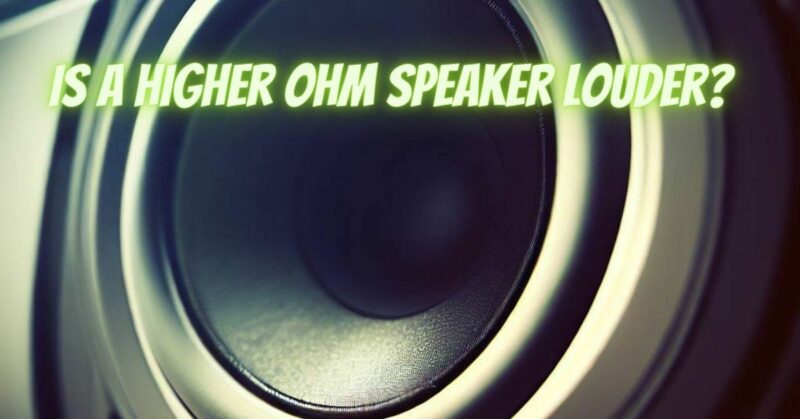The world of audio equipment can be complex, with a plethora of technical specifications that can leave consumers scratching their heads. Among these specifications, speaker impedance, measured in ohms (Ω), is often a source of confusion. Many people wonder whether a higher-ohm speaker is inherently louder than a lower-ohm one. In this article, we will demystify the relationship between speaker impedance and loudness to provide a clear understanding of how speaker impedance affects sound levels.
Understanding Speaker Impedance
Before delving into the topic, it’s essential to grasp the concept of speaker impedance. Speaker impedance is a measurement of the electrical resistance that a speaker presents to the amplifier. It is typically measured in ohms (Ω) and is one of the crucial specifications used to describe a speaker’s electrical characteristics.
The Relationship Between Speaker Impedance and Loudness:
It’s a common misconception that speaker impedance directly determines loudness. In reality, loudness is influenced by various factors, and speaker impedance is just one of them. Here’s what you need to know:
- Amplifier Compatibility: The amplifier’s output power and impedance rating should match or be compatible with the speaker’s impedance. An amplifier is designed to work optimally within a specific impedance range. Using an amplifier with an impedance rating outside its specified range can result in distortion, reduced power output, and even damage to the equipment.
- Efficiency: Speakers have different levels of efficiency in converting electrical power into sound energy. Some higher-ohm speakers are designed to be more efficient, meaning they can produce louder sound levels with less power. However, this efficiency is not solely determined by impedance; it also depends on the speaker’s design, materials, and other factors.
- Power Handling: Power handling capacity is an important consideration. Higher-ohm speakers may have larger voice coils and better heat dissipation capabilities, allowing them to handle more power. This can contribute to their ability to produce louder sound, but again, it’s not just about impedance.
- System Matching: Achieving the best sound quality and loudness involves matching components throughout the audio system. This includes pairing the right amplifier, speakers, and source equipment to create a balanced and efficient system.
- Room Acoustics: The acoustics of your listening environment also play a role in perceived loudness. The size, shape, and acoustic treatment of your room can impact the way sound is distributed and perceived.
When Higher-Ohm Speakers May Excel:
Higher-ohm speakers may have certain advantages in specific scenarios:
- Amplifier Compatibility: If your amplifier is designed to work optimally with higher-ohm speakers, using them can result in better sound quality and potentially higher volume levels.
- Efficiency: Some higher-ohm speakers are engineered for greater efficiency, meaning they can produce more sound with less power. This efficiency can be beneficial in achieving louder volumes.
- Specific Use Cases: In some audio applications, such as professional audio setups or installations where long speaker cable runs are necessary, higher-ohm speakers can be advantageous.
In conclusion, the notion that a higher-ohm speaker is inherently louder is not accurate. Speaker impedance is just one factor among many that affect sound levels. To achieve optimal loudness and sound quality, it’s crucial to consider the entire audio system, including amplifier compatibility, speaker efficiency, and room acoustics. A well-matched audio system, where components complement each other, will provide the best results in terms of loudness and overall sound quality.


